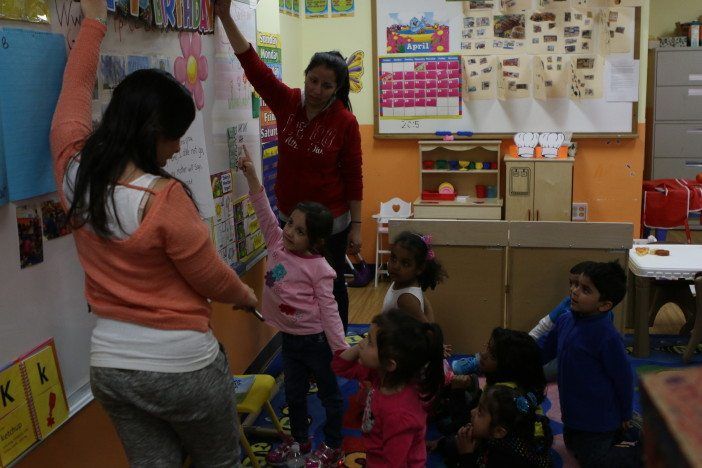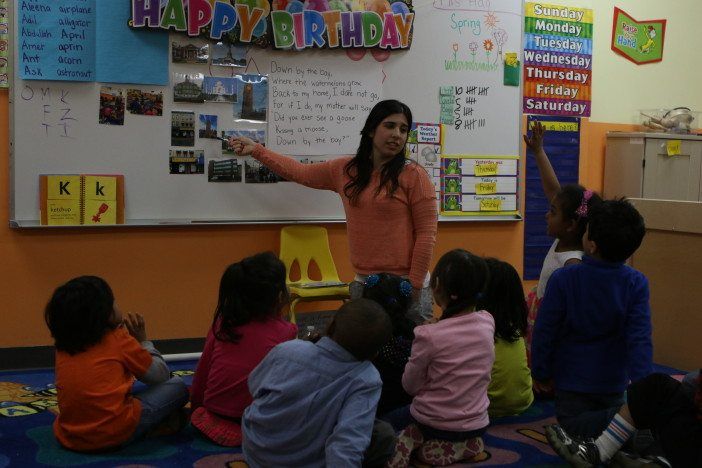For Neighbors, Feeling Recognition & Respect After Muslim Holy Days Are Designated As School Holidays


This spring, Mayor Bill de Blasio announced the Muslim holidays Eid Al-Fitr and Eid Al-Adha were designated as official public school holidays, a move that was welcomed with open arms by residents across the city, including in our neighborhood. For many Muslims, it was a watershed moment representing respect and recognition for a community that has endured an often hostile environment following the September 11, 2001 terrorist attacks. To explore what this change has meant for people in our area, our reporter, Lilly Knoepp, spoke with individuals at the Council of Peoples Organization (COPO), a group based at 1081 Coney Island Avenue that provides social services to the Muslim and other immigrant communities.
By Lillian Knoepp
The four-year-olds at the COPO Pre-K in Midwood, Brooklyn will all start kindergarten next year. They are growing up in an area called, “Little Pakistan,” which means that many of them are Muslim.
Mayor Bill de Blasio added the Muslim holidays of Eid Al-Fitr and Eid Al-Adha to the city’s public school calendar at the beginning of March. This means that these kids will get to celebrate their religious holidays throughout their education.
The preschool is next to the neighborhood’s biggest mosque. On Fridays, thousands of Muslims attend prayers here. Although many have long been finished with school, they are excited that their holidays will finally be recognized.
Waleed Sikander is still in high school. Sikander is a junior at Midwood High School. He said that he will be glad to spend the holidays with his family without having to fear missing a test.
“Now I get to spend time with my family. It’s a special day, “ said Sikander.
“I think that teachers and schools are becoming more accepting of Muslim holidays as an excuse that kids can take off because for a lot of families religion comes first,” he continued.
Mohammad Razvi is the executivecDirector of COPO, which hosts the pre-K as well as a senior center. Razvi has been working to get Muslim holidays added to the school calendar since about 2008. He says that his community feels like they are finally being recognized through the addition of Muslim holidays
“They feel that they are a part of the society and that they are being recognized and respected,” Razvi said.
“The most important thing is for the youth to feel that in school because many of the students they used to take off for the holidays were missing the tests at those times,” the executive director added.

Freedom to practice any religion is a right given to all Americans as a part of the Constitution — but that right is not so simple. CUNY Constitutional Law Professor Ruthann Robson explained how the constitution applies to religious holidays.
“So everyone is covered by the Constitution under the First Amendment which has two clauses, the free exercise clause and the establishment clause,” said Robson. “Usually we think of religious holidays as violating the establishment clause which provides that the government including state and local governments cannot establish a state religion.”
In contrast, the more holidays that are added to the school calendar, the more constitutional the celebration is because the state is not showing a preference to one religion.
This goes back to a precedent-setting Supreme Court case involving holiday displays, Robson says. In the case, the Supreme Court ruled that by only having a Christian display, such as a manger, at Christmas time, the state is establishing or showing a preference for one religion. However, if they add other religions to the display, such as a menorah or a nondenominational Santa Claus with elves and candy canes, then the display is not establishing a state religion.
This argument can also be applied to the holidays in New York City, Robson said, because it is more inclusive to have more religious holidays celebrated on the school calendar.
For Razi and the kids at COPO Pre-K, this means that they will now be able to enjoy religious holidays with the rest of the children in school.
“We feel empowered! Embraced as well as empowered to advocate for their rights as Americans,” said Razvi.
You can listen to Lilly’s interviews here:




